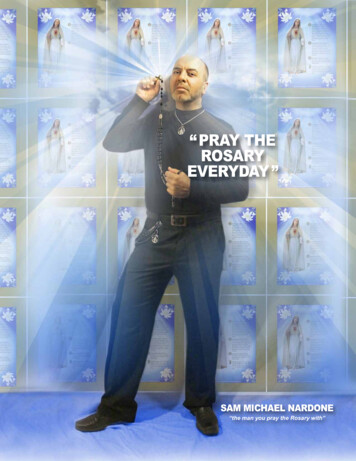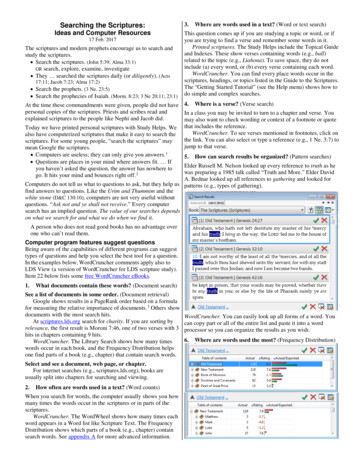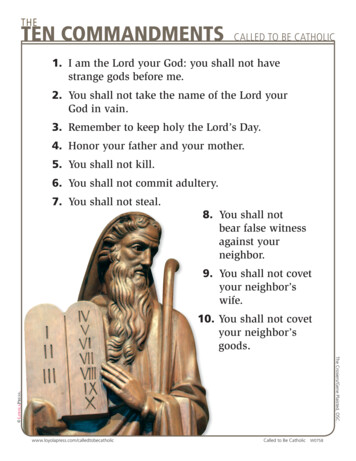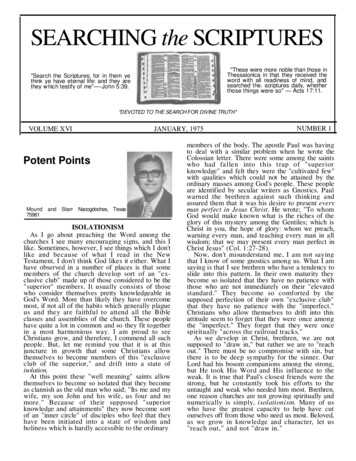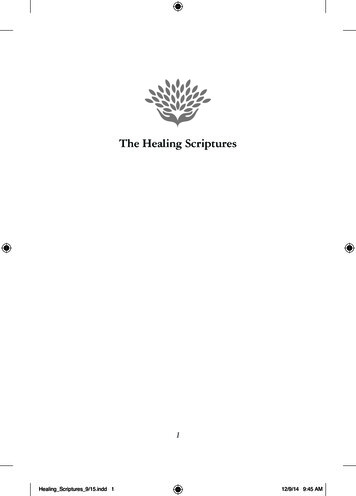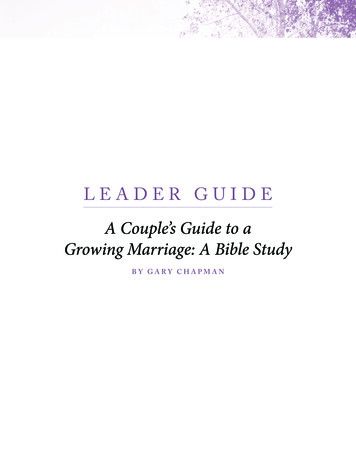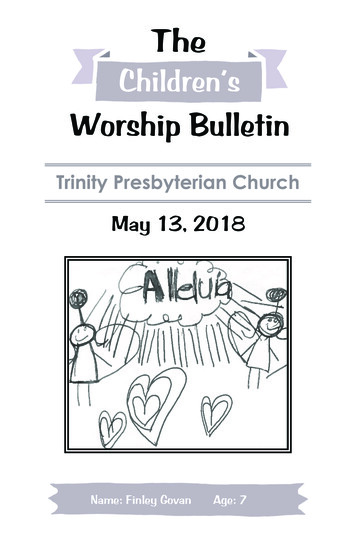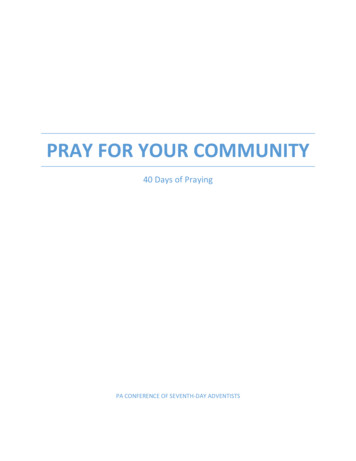
Transcription
Pray theScripturesbibleFour-Part Message SeriesPray the Scriptures Bible is an experiential Bible containing more than 4,500 Scripture-specificprayers and other features. It combines the accurate and readable God’s Word translation with astream of prayers flowing from both heart and mind. It encourages a personal response to Scripture—a daily, constantly deepening conversation with God. As a group study, it can help launchyour church into new experiences of prayer.This document includes four message outlines on Scripture-based prayer by Kevin Johnson,pastor and creator of Pray the Scriptures Bible:Message One: How Does Prayer Fit into My Life?Significant question: What is your experience of prayer right now?Message Two: What Is “Praying the Scriptures”?Significant question: Why do you read the Bible?Message Three: How Do I Pray the Scriptures?Significant question: How will you bring together the Bibleand prayer to pray the Scriptures?Message Four: Pray the Scriptures Worship ServiceSignificant question: How will you make a habit of praying God’s Word?
Message One:How Does Prayer Fit into My Life?Most people pray. Many of us struggle with prayer. We wonder what to say to God and how tosay it. We worry if we will get what we ask or if we can speak honest questions. Pray the Scriptures Bible shows that all of God’s Word teaches us how to pray, opening a one-on-one conversation with the God who speaks to us in his Word. This message explores why and how we pray.Significant question: What is your experience of prayer right now?Message OutlineStart with your own story of prayer. Describe an experience of prayer where you sensed a connection with God and a satisfaction with the outcome. (How did prayer build your connectionwith God? What happened because you prayed? What did praying accomplish in you?) Thengive details of a time or a season when prayer was difficult for you.It can feel almost impossible to build a habit of prayer that grows day after day, year after year.Most of us don’t pray as we should for all kinds of reasons, including:Our prayers may not seem to bring us closer to God.Our prayers may not get the results we expect.Our prayers may not feel like they measure up.The Bible describes a different experience of prayer:Prayer should be natural. (Matt. 6:5–13)Prayer should be persistent. (Matt. 7:7–11)Prayer should be continual. (Eph. 6:18, 1 Thess 5:17)We have to admit there’s often a gap between prayer in our everyday lives and a biblical experience of prayer. Praying the Scriptures helps close this gap:It shows that all of God’s Word teaches us how to pray.By bringing together Scripture with a stream of responsive prayers, it opensa one-on-one conversation with the God who speaks to us in his Word.The prayers and notes in Pray the Scriptures Bible were written by Kevin Johnson.Kevin pastors Emmaus Road Church in the Minneapolis metro area. He is thebestselling author of nearly sixty books and study Bibles for adults, youth, and children.Learn more about him at kevinjohnsonbooks.com.
Kevin says:Pray the Scriptures Bible grew out of my own journey with God—years of taking theBible seriously, first as a follower of Jesus, then as a leader and spiritual shepherd, andfinally as an author intent on making Scripture real and relevant to all ages. The moretime I spent in the Bible, the more Scripture and prayer came together. It becamehabit to respond in prayer to the passage I studied.Hebrews 4 says, “God’s word is living and active. It is sharper than any two-edgedsword and cuts as deep as the place where soul and spirit meet, the place wherejoints and marrow meet. God’s word judges a person’s thoughts and intentions. Nocreature can hide from God. Everything is uncovered and exposed for him to see. Wemust answer to him” (Heb. 4:12–13).Because God spoke to me, I spoke back to him. As his Word cut to my core,I talked to him about what he laid bare. I answered to him.As we learn to take what we read in Scripture and turn it back to God, we find that the Biblegives us words to pray. Scripture-based prayer doesn’t replace other types of prayer. But it enriches all of our conversations with God by supplying an endless variety of vocabulary, themes,and concerns. It sets the tone for how we speak with God. We’ll learn more about what it meansto “pray Scripture” next week.Explain how your church can begin to practice this kind of prayer:Use Pray the Scriptures Bible in your normal Bible reading. Look for the prayers in theouter margin. Pray them as is or adapt them into your own prayers.Use the topical index to explore interests or concerns.Use the authentic prayer articles to discover new types of prayer.Conclude by sharing how you have found Pray the Scriptures Bible helpful and describing whatyou hope this experience of praying the Scriptures will do for your church.
Message Two:What Is “Praying the Scriptures”?We read the Bible for a variety of reasons, but in John 5:39–40 Jesus raised the possibility of ourstudying Scripture without ever authentically meeting him. Praying the Scriptures brings together Bible reading and prayer to help us experience God. While the Bible teaches us truth andtransforms us, our ultimate purpose in opening the Bible is encountering the one true God.Significant question: Why do you read the Bible?Message OutlineStart by tracing your own history of Bible reading. When did you first start reading Scripture?What were you looking for? How and why did Bible reading become a habit? How have yourgoals changed over time? How did you discover that Scripture is more than a doctrinal statementor a collection of insights for life—that it leads you into an authentic relationship with God?There are a variety of reasons we open God’s Word. Three Bible scenes illustrate some key motivations:The Bible teaches us truth. After Jesus helps Thomas discover the reality of his resurrection, John explains that the acts of Jesus “are written so that you may believe thatJesus is the Christ, the Son of God, and that by believing you may have life in his name”(John 20:31 ESV). Often we approach Scripture to gain essential information. But someChristians take this to an unhelpful extreme by focusing on minor points of belief orreading the Bible from rote habit. They reduce the Bible to a book of arguments andabstractions.The Bible trains us how to live. As the apostle Paul faces his imminent death, hegives final instructions to his younger ministry partner, Timothy. Paul says that “EveryScripture passage is inspired by God. All of them are useful for teaching, pointing outerrors, correcting people, and training them for a life that has God’s approval” (2 Tim.3:16). Spending time in Scripture brings life-changing transformation. But some Christians become so absorbed with their own needs, or they focus on a broken world thatneeds fixing, to the point where they make the Bible little more than a to-do list. Theymiss the opportunity to encounter God.The Bible leads us into a relationship with God. When the Pharisees accused Jesusof making himself equal with God (John 5:18), he replied, “You study the Scripturesdiligently because you think that in them you have eternal life. These are the veryScriptures that testify about me, yet you refuse to come to me to have life” (John5:39–40 NIV). God gives us the Bible for information—so we can grapple with truth.He uses Scripture for transformation—to make us new people and to show us how tolove our world. But God ultimately invites us to read the Bible for revelation—so wecan know and experience him now and forever. We miss the most important purposeof Scripture if our Bible reading doesn’t cause us to interact with God. Every part of anauthentic Christian life flows from that life-giving connection.
Describe how people in your tradition or church approach Scripture. What is their first impulse,their default setting? Do they read for information, transformation, or revelation? What are theirstrengths in Bible reading? What do they miss?Praying the Scriptures helps us read the Bible not only for information or transformation butalso for revelation—the opportunity to experience God.Praying the Scriptures is an old spiritual discipline. It is also a fresh approach that will help eachof us interact with God. Whenever we take God’s words to us in the Bible and pray them back tohim, we are “praying the Scriptures.”For example, even the best known psalms often talk about God rather than to God. In prayingthe Scriptures we turn the declaration “The Lord is my Shepherd” into “You are my shepherd”:The Lord is my shepherd. I am never in need. He makes me lie down in green pastures.He leads me beside peaceful waters. He renews my soul. He guides me along thepaths of righteousness for the sake of his name. (Ps. 23:1–3)Because you are my shepherd, I will never lack. You let me stretch out in peace. You fillmy soul. You guide my life so your name receives glory. (Pray the Scriptures Bible, p. 751)We can take the great commandment that we love God and love others found in Matthew22:37–39 and pray something like this:I’ll love you with every bit of my heart, soul, and strength. I’ll love others at least asmuch as I love myself. You expect nothing more or less. (PSB, p. 1385)Share other examples from Pray the Scriptures Bible or your own Scripture-based prayers thatyou have found meaningful.Praying the Scriptures brings obvious benefits.Scripture-based prayer opens a direct conversation with God. It helps us meetGod every time we open his Word. God speaks to us, and we speak back to him.Scripture-based prayer opens our minds and hearts to our God. It helps us voicehonest thoughts and feelings that we otherwise might never express.Scripture-based prayer opens us to new areas of growth and mission. Whenwe read the Bible and respond to God in prayer, we have an opportunity to commitourselves afresh to God’s purposes.When we come to the Bible wanting and expecting to meet God, praying Scripture isa natural response. Some of us stumble on this habit, but most of us need to see what it isand put it into practice.Conclude by explaining how your church can continue to explore Pray the Scriptures Bible.Next week you will answer the question “How do I pray the Scriptures?”
Message Three:How Do I Pray the Scriptures?Praying the Scriptures is the simple act of taking God’s words to us in the Bible and prayingthem back to him. It can become a natural response to God whenever we open the Bible. Usethis message and the next as workshops in prayer to give your church practical tips for prayingthe Scriptures.Significant question: How will you bring together the Bibleand prayer to pray the Scriptures?Message OutlinePraying Scripture is a biblical idea. Back in the earliest days of the New Testament church, Peterand John were heading to the temple to pray when they were confronted by a man unable towalk since birth. When he asked for money, they had nothing to give. But they commanded himin the name of Jesus to rise up and walk. The man stood, then went “walking and jumping, andpraising God” (Acts 3:8 NIV).The crowd’s amazement upset the ruling religious leaders, who seized Peter and John andtossed them in jail. Once on trial, these two men pointed out that they were being bullied for thecrime of kindness. Dumbfounded, the court officials ordered them to never again mention Jesusand released them.Peter and John returned to their friends and repeated everything the chief priests and otherleaders had told them. After hearing the details, the followers of Jesus prayed loudly together(Acts 4:23). Their words formed as an instant and instinctive response to the press of real circumstances.Their prayer started with worship: “‘Sovereign Lord,” they said, ‘you made the heavens and theearth and the sea, and everything in them’” (Acts 4:24 NIV). Opening with the words “SovereignLord” was saying, “O God, who is in charge of everything” or “O God, the ruler of all.” To declare,“You made the heavens and the earth” means “You made everything there is—nothing existsthat didn’t come from you.”And then they prayed, “You made the sea.” We might read that as, “God, you created the beachand sunshine” or “You made that oceanside place where I want to retire.” But the Hebrews hadfew happy feelings about large bodies of water. The sea meant chaos. They were saying, “God,you are master of chaos and everything we can’t control,” which fits the outrageous scene ofPeter and John being arrested and thrown in jail for doing kindness in the name of Christ. All ofthis adds up to saying, “God, you’re in charge. You’re in control of this situation we’re in.”Then these early Christians did an intriguing thing. They prayed the Scriptures, quoting Psalm2:1–2 to God. What they said amounts to, “You told us a long time ago that people would oppose Jesus.” They prayed, “You spoke long ago by the Holy Spirit through our ancestor David,your servant, saying, ‘Why were the nations so angry? Why did they waste their time with futileplans? The kings of the earth prepared for battle; the rulers gathered together against the Lordand against his Messiah’” (Acts 4:25–26 NLT).
As the early disciples understood, the Bible teaches us to pray. It inspires a variety of prayers.The “Authentic Prayer” articles in Pray the Scriptures Bible detail more than two dozen types.Some examples:worship (p. 1752)surrender (p. 1481)silence (p. 704)confusion ( p. 1308)grace ( p. 1633)guidance ( p. 324)As we read the Bible it helps to recognize basic ways we can respond to God. Our prayers candeclare, identify, confess, commit, or ask. Invite your congregation to turn to the following passages in Pray the Scriptures Bible, and display these verses and prayers on-screen or in print.For each example, read the passage and invite your congregation to respond in prayer.Many passages move us to declare who God is or what he has done, is doing, or will do.For example, the first verse of the Bible says,“In the beginning God createdheaven and earth.” (Gen. 1:1)(We can pray . . .) You created everythingthat exists, from the earth under my feetto the heavens above. (PSB, p. 4)We might identify with a person, thought, or feeling. Job’s friends heard abouthis pain and for a time they wept with him without saying a word.“When Job’s three friends heardabout all the terrible things that hadhappened to him, each of them camefrom his home—Eliphaz of Teman,Bildad of Shuah, Zophar of Naama.They had agreed they would gotogether to sympathize with Job andcomfort him.” (Job 2:11)I need people to comfort me in mypain. Give me friends who will cry withme and say nothing. (PSB, p. 679)“So I tell you and encourage you inthe Lord’s name not to live any longerlike other people in the world. Theirminds are set on worthless things.They can’t understand because theyare in the dark. They are excludedfrom the life that God approves ofbecause of their ignorance and stubbornness.” (Eph. 4:17–18)My mind used to be set on worthlessthings. I was in the dark and didn’tknow it. I was ignorant and stubborn,practicing all kinds of evil and alwayswanting more. (PSB, p. 1650)A passage might prompt us to confess something that’s come between us and God.The apostle Paul told the Ephesians,
Often what we read calls us to commit to living differently. We can find lessonsto apply even in out-of-the-way portions of the Bible. For example, God told his OldTestament people,“When you sacrifice a thank offeringto the Lord, do it in the proper way.Eat it the same day. Never leave anyof it until morning. I am the Lord.Carefully obey my commands. I amthe Lord. Never dishonor my holyname. I will show my holiness amongthe Israelites. I am the Lord, who setsyou apart as holy. I brought you out ofEgypt to be your God. I am the Lord.”(Lev. 22:29–33)I want to offer myself to you in everyright way. I’ll carefully obey your commands. You rescued me. You are God.(PSB, p. 164)“‘When that day comes,’ declares theLord, ‘I will gather those who arelame. I will bring together those whoare scattered and those whom I haveinjured.’” (Mic. 4:6)Make broken people whole. Bringhome the scattered. Teach us yourthoughts and help us understand yourplans. (PSB, p. 1295)You might ask the Lord to work in you or to meet a need. The prophet Micahforesaw the Lord’s future actions. He prophesied,Micah said of other nations, “Theydon’t know the thoughts of the Lordor understand his plan.” (Mic. 4:12)The prayers in Pray the Scriptures Bible are just a beginning. The prayers it scripts aren’t thefinal word. They’re a starting point for our own prayers. They encourage our own one-on-oneconversations with God as we process our own circumstances and speak our own spiritual longings, wonderings, and worship.We can find our own words. Jesus denounced religious teachers who thought prayer neededto be loud, long, or eloquent (Matt. 6:5–8). The prayers in Pray the Scriptures Bible are simplewords to reflect on and offer to God. They intentionally stay close to the Bible text so the connection between a passage and prayer isn’t lost in excessive poetry or artistry. They are words andthemes that fit easily in anyone’s mouth.These prayers aren’t just meant for ourselves. Although for consistency the prayers in Praythe Scriptures Bible are written in first person (usually I, sometimes we), they can be adaptedto pray for others—family, friends, neighbors, co-workers, people we struggle to love, and theworld at large. We can pray them with others—in pairs, groups, and gatherings.Pray all of the Bible. Scripture-based prayers let us move beyond our favorite passages. Prayingthe whole Bible forces us to form prayers from both teachings and stories . . . to make sense ofchallenging and awkward passages . . . to find personal relevance in verses dense with historyand sparse on obvious application. This is an opportunity to interact with the Lord who hasreached out to people throughout history and who still reaches out to you now.Close by explaining how you are putting these ideas into practice. Next week you will create anexperience of praying the Scriptures.
Message Four:Pray the Scriptures Worship ServiceThe most crucial part of praying the Scriptures is simply starting . . . doing . . . acting . . . lettingthis become an unconscious habit that brings the Bible and prayer together in a deeper connection with God. The intent of this message is to create an experience different from a traditionalsermon. Give your church an extended opportunity to pray Scripture and connect with God in anew way.Significant question:How will you make a habit of praying God’s Word?Message OutlineMove from talking about prayer to doing prayer. Make the most of the creativity in your churchto create a powerful experience of praying Scripture. Use prayers from Pray the Scriptures Bibleor create your own as you use any of the following options:Create a “message” of Scripture reading and prayer. Select passages significantto your congregation—that frame your mission, highlight important themes, or speakto a current situation. Or choose from the broad sweep of Scripture. Put Scriptures andcorresponding prayers on screens. Read passages from up front or scattered aroundthe congregation. Invite everyone to read the prayer in response.Do a “walkaround worship.” Put passages and prayers on posters scattered aroundyour space. Instruct worshipers to read, think, and pray these words. Close with somecorporate readings and prayers.Let your congregation drive the experience. Invite people to choose passages tobe read and prayed from Pray the Scriptures Bible or to contribute their own prayerfulresponses.Create art. Combine succinct verses and prayers in whatever media fits your setting.Break into clusters to read and pray. Let worshipers process what they have experienced over the past weeks. Participants can share a verse and a short response.Ask people to share how they are practicing praying the Scriptures. Whetheryou prepare these speakers in advance or open up a microphone, invite people toshare how Scripture-based prayers are bringing them into a deeper life with God.Close with thoughts on how your community can make praying the Scriptures an ongoing habit.Unless otherwise indicated, Scripture quotations are from God’s Word . 1995 God’s Word to the Nations. Used by permission of Baker Publishing Group.Scripture quotations labeled ESV are from The Holy Bible, English Standard Version (ESV ), copyright 2001 by Crossway, a publishing ministry of Good News Publishers. Used by permission. All rights reserved. ESV Text Edition: 2007Scripture quotations labeled NIV are from the Holy Bible, New International Version . NIV . Copyright 1973, 1978, 1984, 2010 by Biblica, Inc. Used by permission ofZondervan. All rights reserved worldwide. www.zondervan.comScripture quotations labeled NLT are from the Holy Bible, New Living Translation, copyright 1996, 2004, 2007 by Tyndale House Foundation. Used by permission ofTyndale House Publishers, Inc., Carol Stream, Illinois 60188. All rights reserved.
Praying the Scriptures is an old spiritual discipline. It is also a fresh approach that will help each of us interact with God. Whenever we take God's words to us in the Bible and pray them back to him, we are "praying the Scriptures." For example, even the best known psalms often talk about God rather than to God. In praying

